A Mother's Love
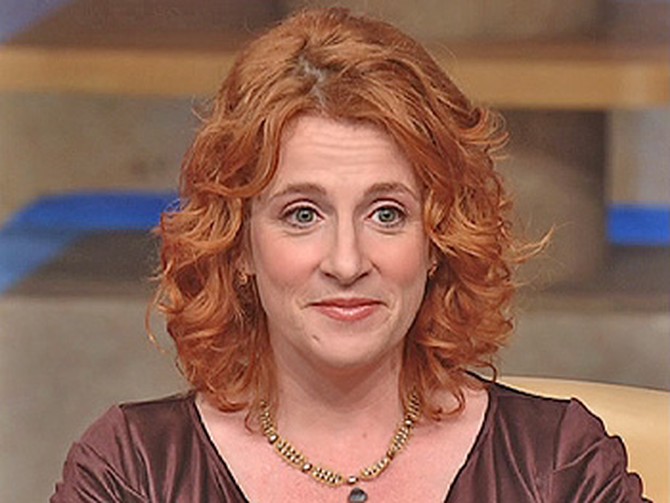
Ayelet Waldman is a Harvard-trained lawyer turned stay-at-home mom turned writer who has been married to Pulitzer Prize-winning author Michael Chabon for 12 years. The mother of four says that her children are not the center of her universe—and, she says, that's the key reason she and her husband have a very passionate sex life.
In a provocative New York Times article, Ayelet recently made a controversial confession. She boldly proclaimed, "I love my husband more than I love my children." Ayelet's article struck a nerve with moms around the country, and some of them are here to talk to her about it.
In a provocative New York Times article, Ayelet recently made a controversial confession. She boldly proclaimed, "I love my husband more than I love my children." Ayelet's article struck a nerve with moms around the country, and some of them are here to talk to her about it.
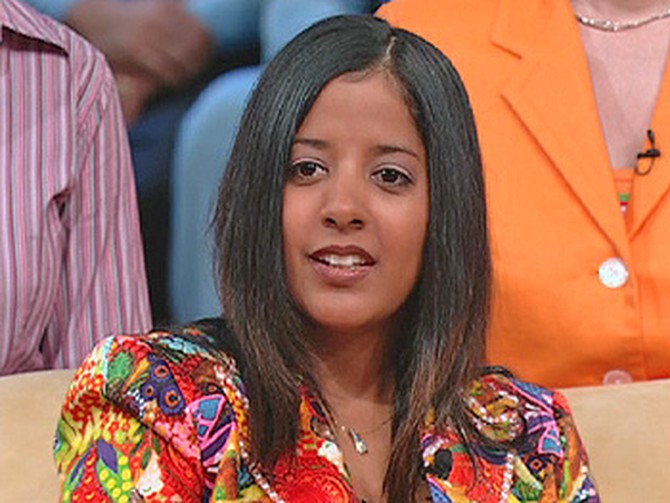
Tara believes that Ayelet is doing a disservice to her family.
Tara: I think that children are such a gift, and I think that there is a healthy balance that can be formed with the family, not necessarily putting one above the other, per se.
Ayelet: I absolutely agree. I think that's a really good point, and I think that is sort of the point of my article—which is that I think we've, as a society, we've kind of lost that balance. So many women today have become so focused on their children, they've developed these romantic entanglements with their children's lives, and the husbands are secondary. They're left out. And the romantic focus is on the children. I mean, you guys know Valentine's Day at your kids' schools. What happens on Valentine's Day? All the moms come in with perfectly frosted pink cupcakes that they've made with their kids. Well, what's Valentine's Day? Is Valentine's Day a day to make cupcakes with your children? No, Valentine's is supposed to be a day about romantic love.
Tara: I think that children are such a gift, and I think that there is a healthy balance that can be formed with the family, not necessarily putting one above the other, per se.
Ayelet: I absolutely agree. I think that's a really good point, and I think that is sort of the point of my article—which is that I think we've, as a society, we've kind of lost that balance. So many women today have become so focused on their children, they've developed these romantic entanglements with their children's lives, and the husbands are secondary. They're left out. And the romantic focus is on the children. I mean, you guys know Valentine's Day at your kids' schools. What happens on Valentine's Day? All the moms come in with perfectly frosted pink cupcakes that they've made with their kids. Well, what's Valentine's Day? Is Valentine's Day a day to make cupcakes with your children? No, Valentine's is supposed to be a day about romantic love.
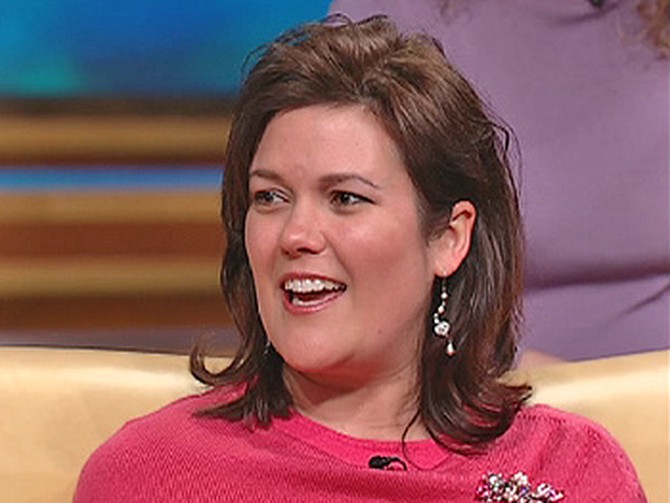
Kelly says she had a lightbulb moment reading Ayelet's article.
"I just realized I've given all of my energy and passion and love into my little girl," says Kelly. "I don't think that's wrong, but the article made me see that I need to give some of that to my husband, too. I just felt that I needed to find a little bit better balance because he'd been put on the back burner. … I feel if you don't have that connection with your husband—if you let that go during these years that you're raising your kids—they're going to be gone and grow up and you're going to be left, the two of you. And you don't want to all of a sudden discover you don't have anything in common anymore."
"I just realized I've given all of my energy and passion and love into my little girl," says Kelly. "I don't think that's wrong, but the article made me see that I need to give some of that to my husband, too. I just felt that I needed to find a little bit better balance because he'd been put on the back burner. … I feel if you don't have that connection with your husband—if you let that go during these years that you're raising your kids—they're going to be gone and grow up and you're going to be left, the two of you. And you don't want to all of a sudden discover you don't have anything in common anymore."
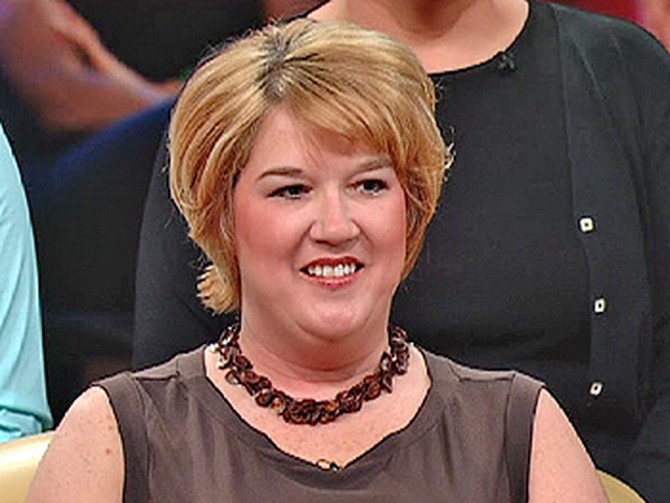
Lee Ann says she and her husband have decided to make their kids the center of their universe, and that's what works for them. But, Lee Ann admits that she watches TV while she and her husband have sex.
Oprah: What are you watching?
Lee Ann: It's Oprah or Wheel of Fortune on the occasion that I am just too exhausted. After the third night in a row, I may watch TV, while he does his business. I am satisfying his needs.
Oprah: What are you watching?
Lee Ann: It's Oprah or Wheel of Fortune on the occasion that I am just too exhausted. After the third night in a row, I may watch TV, while he does his business. I am satisfying his needs.
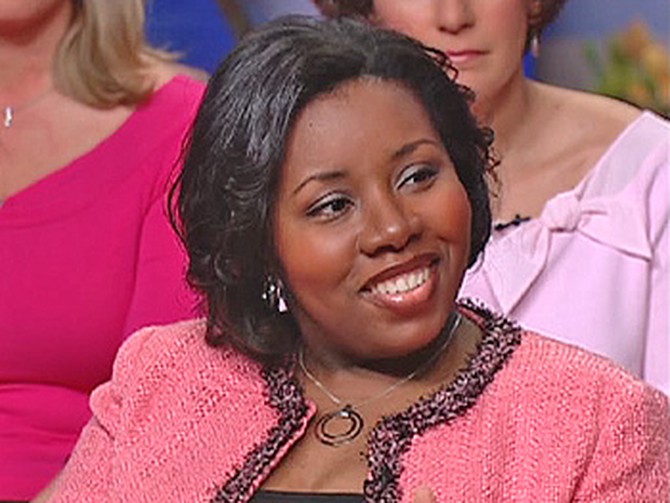
Shonda agrees with Ayelet that a woman must keep her relationship with her husband a priority. "I'm a stay-at-home mom and I'm tired," she says. "Yeah, kids are a lot of work. … [But] you can't put your husband on the back burner."
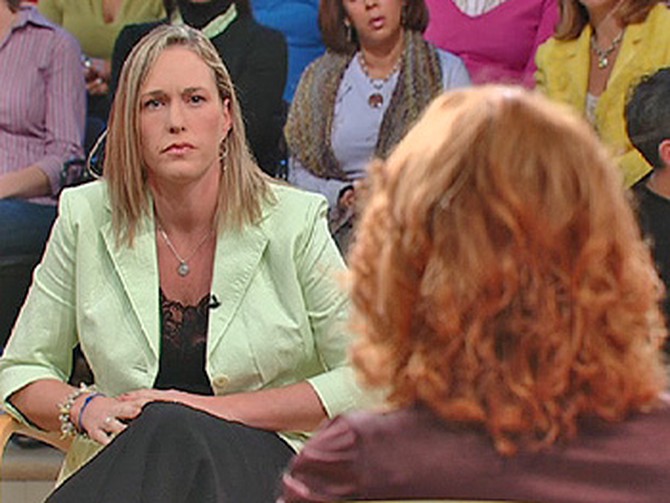
Like millions of women out there who feel pressure to be supermoms, Lezlee says she has to make sacrifices to meet the needs of her children, and sometimes those sacrifices include her husband.
"My life is overcommitted so it affects my relationship with my husband—that does affect our sex life, definitely," Lezlee says. "I'm so tired, so it's hard to just stop and switch gears to that. The needs of the children have to come first. I'm trying to make sure they have a great self-esteem and a great childhood. And it's hard because I have so many commitments, so my husband does get put on the back burner just because I only have 24 hours."
"My life is overcommitted so it affects my relationship with my husband—that does affect our sex life, definitely," Lezlee says. "I'm so tired, so it's hard to just stop and switch gears to that. The needs of the children have to come first. I'm trying to make sure they have a great self-esteem and a great childhood. And it's hard because I have so many commitments, so my husband does get put on the back burner just because I only have 24 hours."
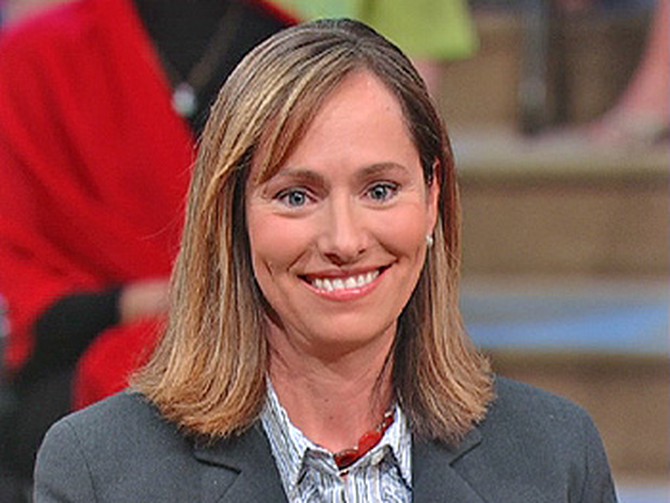
Muffy Mead-Ferro, author of Confessions of a Slacker Mom, can relate to the conflict Lezlee and other "supermoms" feel. "After I first had kids, I let myself focus all of my love and attention on my children," Muffy says. "I let my marriage go by the wayside, and I realized that sex had become another chore. I, too, fell into bed at the end of the day not only exhausted, but irritated. … I felt it was my husband's fault that I had so much to do."
Muffy says she ditched her "supermom" schedule so her kids will have better relationships in the future. "We all want our kids to succeed, and I'm no different—even though I call myself a slacker mom," Muffy says. "I want them to be happy. My question is: What is going to get them there? When I think about what has brought me happiness in my own life, it's the relationships that I have with other people, number one. That includes my husband. And, you know, what kind of a person wants to have a relationship with somebody who's been raised to believe that they are the center of the world?"
Muffy says she ditched her "supermom" schedule so her kids will have better relationships in the future. "We all want our kids to succeed, and I'm no different—even though I call myself a slacker mom," Muffy says. "I want them to be happy. My question is: What is going to get them there? When I think about what has brought me happiness in my own life, it's the relationships that I have with other people, number one. That includes my husband. And, you know, what kind of a person wants to have a relationship with somebody who's been raised to believe that they are the center of the world?"
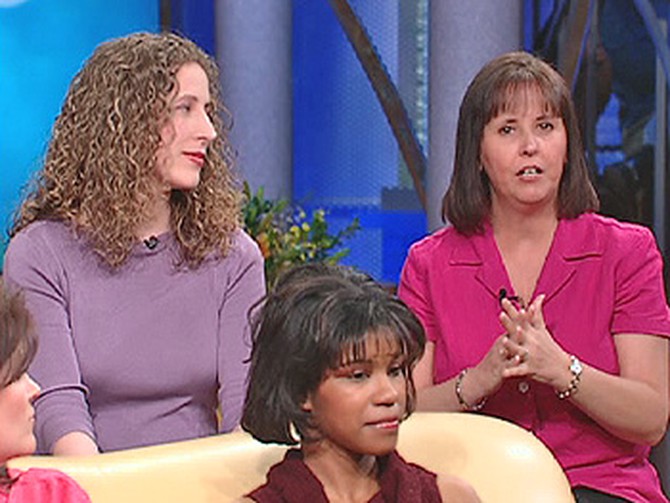
Kathy and her daughter Lisa say that they agree with Ayelet that children benefit if their parents' marriage is top priority.
Lisa: You're talking about nurturing your children and taking care of them, but part of nurturing is also letting them see the affection you have for your husband. I watched [my parents] hold hands. I've watched them kiss.
Kathy: My husband came home from work one day and he sat at the dinner table, and I was nursing my first born. He said, "I've lost my best friend." I looked at him and I said, "Oh, who? Who's your friend? Who did you lose?" And he looked at me and he said, "You." Just for a split second I wanted to yell at him and say, "Look, this baby needs me. You don't." And then I saw the look on his face and I knew that I could be the best mom in the world and I could be the best wife, but I had to prioritize what I was thinking. If you're thinking that you just can give to one and not the other, you can't do that.
Lisa: You're talking about nurturing your children and taking care of them, but part of nurturing is also letting them see the affection you have for your husband. I watched [my parents] hold hands. I've watched them kiss.
Kathy: My husband came home from work one day and he sat at the dinner table, and I was nursing my first born. He said, "I've lost my best friend." I looked at him and I said, "Oh, who? Who's your friend? Who did you lose?" And he looked at me and he said, "You." Just for a split second I wanted to yell at him and say, "Look, this baby needs me. You don't." And then I saw the look on his face and I knew that I could be the best mom in the world and I could be the best wife, but I had to prioritize what I was thinking. If you're thinking that you just can give to one and not the other, you can't do that.

Lynn, a mother of two, says her marriage of 14 years is ending because she always put her children first. She says by the time she realized that she wanted to make her marriage the priority it was too late. "I banked on my husband being there just from our foundation, from our faith and trust," Lynn says. "I did bank a little bit on his intuitiveness, I guess, and his just understanding about being a mother.
"Balance is the key. Just learning the best way to communicate with your husband is key. Reconnecting there. Letting him know every week that you love him."
"Balance is the key. Just learning the best way to communicate with your husband is key. Reconnecting there. Letting him know every week that you love him."
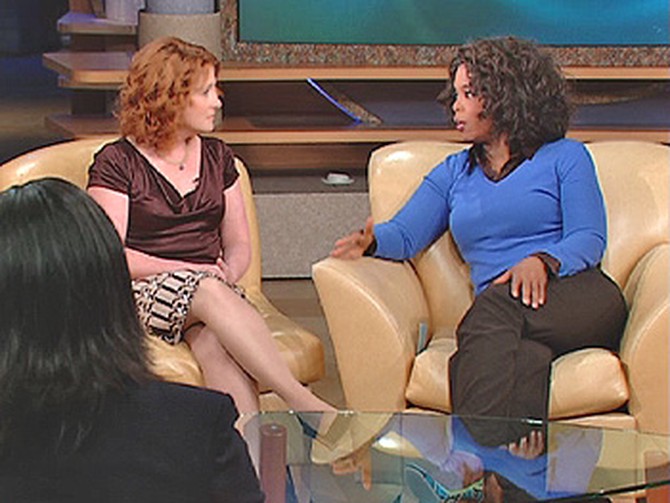
Ayelet says her article is her way of exploring the guilt and ambivalence she feels about motherhood—not how much she loves her children.
Ayelet: I have made so many mistakes as a mother. But the one thing that I know I do is I make sure my children know how much I love them and they are absolutely secure in that.
Oprah: I think a lot of people interpreted it, or misinterpreted, that article that you wrote…when you say I love my husband more, I think a lot of women heard you don't love your children.
Mothers in the discussion: Why can't you say to them I love your daddy different? Why is there such an obsession of putting somebody before the other?
Ayelet: [In the article] I was responding to what I have seen as a replacement. And what I say is I'm in love with my husband but I love my children. I mean the truth is, yes, of course you love people differently. But what I'm saying is I don't think what we're seeing nowadays is people loving differently. I think we're seeing people loving more.
Ayelet: I have made so many mistakes as a mother. But the one thing that I know I do is I make sure my children know how much I love them and they are absolutely secure in that.
Oprah: I think a lot of people interpreted it, or misinterpreted, that article that you wrote…when you say I love my husband more, I think a lot of women heard you don't love your children.
Mothers in the discussion: Why can't you say to them I love your daddy different? Why is there such an obsession of putting somebody before the other?
Ayelet: [In the article] I was responding to what I have seen as a replacement. And what I say is I'm in love with my husband but I love my children. I mean the truth is, yes, of course you love people differently. But what I'm saying is I don't think what we're seeing nowadays is people loving differently. I think we're seeing people loving more.
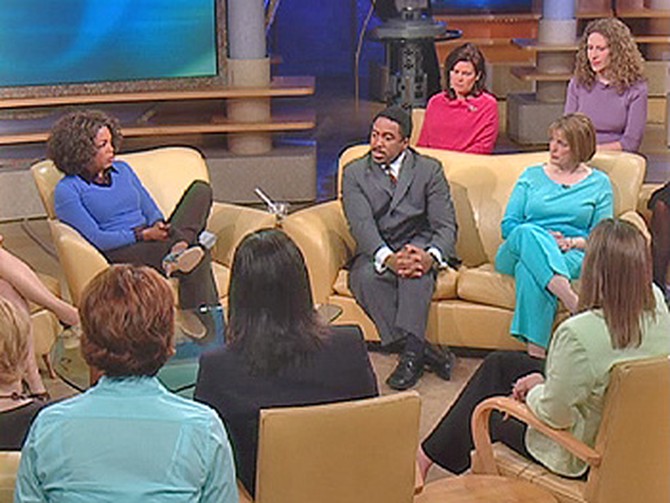
Roland Warren is the President of the National Fatherhood Initiative, and he says that there is a clear difference between the way women and men think of their roles after they get married and have a family.
"I think, frankly, for men the 'wife and the kids' is all one package. We don't separate that out," Roland says. "That said, from a relationship standpoint, one of the relationships has to come first, it's just the reality of it. … There's a perception I'm hearing here that somehow you can wait [to work on your marriage.] Strong marriages are like strong muscles. If you don't exercise them, they atrophy."
Roland also says instead of looking at children as the building blocks of marriage, couples should focus on the primary relationship that provides children security—the marriage. "When a husband and wife work well together, they create this kind of basket, which provides security for children," Roland says. "That's the primary relationship. And I think if you can balance yourself from the perspective of putting that relationship first, building on that, that's the foundation that gives your kids security that they need."
"I think, frankly, for men the 'wife and the kids' is all one package. We don't separate that out," Roland says. "That said, from a relationship standpoint, one of the relationships has to come first, it's just the reality of it. … There's a perception I'm hearing here that somehow you can wait [to work on your marriage.] Strong marriages are like strong muscles. If you don't exercise them, they atrophy."
Roland also says instead of looking at children as the building blocks of marriage, couples should focus on the primary relationship that provides children security—the marriage. "When a husband and wife work well together, they create this kind of basket, which provides security for children," Roland says. "That's the primary relationship. And I think if you can balance yourself from the perspective of putting that relationship first, building on that, that's the foundation that gives your kids security that they need."
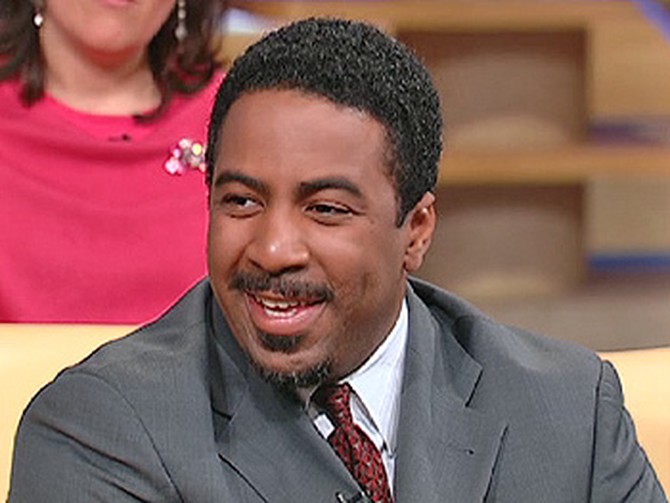
Roland Warren also warns that if you think you can put your marriage on the back burner until the kids are gone, think again! Your grown children will more than likely come back home. "You've invested all of your time, all of your emotion, all of your focus, all of your intimacy, into your children," Roland says. "The reason these kids are coming back is because you've built the construct that your relationship with your husband is not the primary relationship."
According to Roland, Ayelet's approach is a good model for marriages. "It provides security for the kids that they need, it provides strength in the marriage that you need and ultimately it provides you the balance that you need," Roland says. "Part of the reason [Ayelet's] husband is so sexy to her is because he's actually, in a weird kind of way, tied into her maternal instinct because he's such a good father for their children. Generally, if you over-mother, you don't allow him to father. He fathers differently [than you mother.] If you allow him to father more it creates balance for you, the sexier he gets."
According to Roland, Ayelet's approach is a good model for marriages. "It provides security for the kids that they need, it provides strength in the marriage that you need and ultimately it provides you the balance that you need," Roland says. "Part of the reason [Ayelet's] husband is so sexy to her is because he's actually, in a weird kind of way, tied into her maternal instinct because he's such a good father for their children. Generally, if you over-mother, you don't allow him to father. He fathers differently [than you mother.] If you allow him to father more it creates balance for you, the sexier he gets."
Published 04/20/2005

